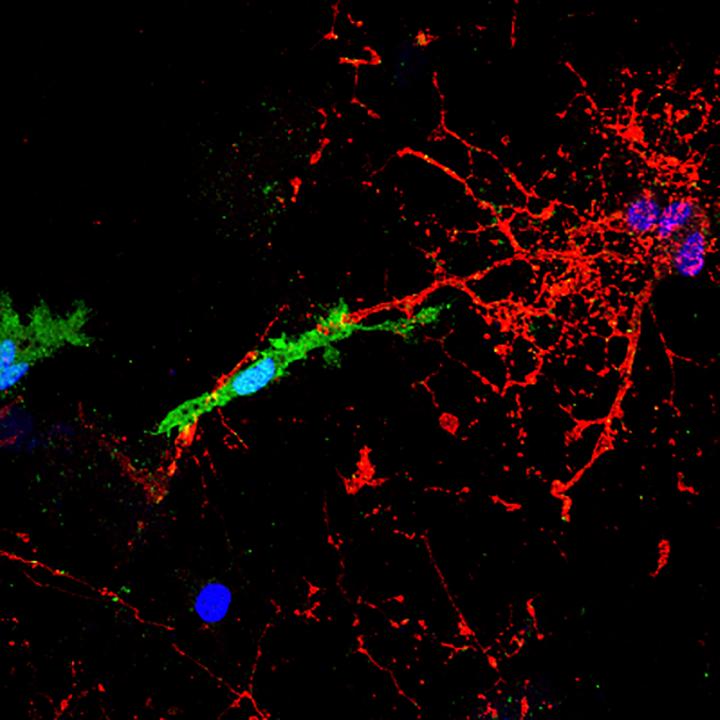Neurology: Publication in PNAS

Credit: HHU / Joel Gruchot / Patrick Küry
Early disease stages of MS are primarily characterised by immune cell infiltration of the CNS. This causes inflammation that damages the so-called myelin sheaths. Myelin sheaths are electrically insulating structures established by specialised glial cells of the CNS, referred to as ‘oligodendrocytes’. These structures protect, nourish and stabilise axons, which transmit electrical signals between neurons.
There is a large therapeutic repertoire of immunomodulatory drugs available that can effectively target the inflammatory aspects of relapsing multiple sclerosis (RMS). But when MS progresses, damage accumulates which ultimately results in irreversible deficits and clinical disability. Unfortunately, despite decades of intense research disease progression is still untreatable as there are no therapies available that either prevent damage or repair injured axons.
In a new study published online on June 18 in the renowned journal PNAS a research team led by Prof. Dr. Patrick Küry from the Department of Neurology (chaired by Prof. Dr. Hans-Peter Hartung) has shed light on a novel axon damage mechanism which could be highly relevant for progressive MS (PMS) patients.
As outlined by the first author of this research paper, Dr. David Kremer, the envelope (ENV) protein of the pathogenic human endogenous retrovirus type W (pHERV-W) was found to be a major contributor to nerve damage in MS. In collaboration with research teams in Cleveland (OH, USA) and Montreal (CAN) the authors demonstrated that the ENV protein drives CNS resident microglial cells to contact and damage myelinated axons.
Alongside the scientific research into determining how the damage mechanism works, clinical developments aiming at neutralising the harmful ENV protein in MS patients have also progressed. Two clinical studies conducted under the supervision of Prof. Hartung have already successfully tested the ENV-neutralising antibody temelimab. MRI scans of the participants treated in the study showed reduced damage to the nerve tissue.
The Düsseldorf-based researchers and their colleagues can therefore explain why neurodegeneration is decreased in patients treated with temelimab. This antibody specifically binds to the ENV protein of the retrovirus and blocks its activity in the CNS. As stated by Prof. Hartung, future clinical studies in progressive MS patients will now have to demonstrate whether temelimab treatment can also improve clinical symptoms resulting from neurodegeneration.
###
Original publication
Kremer D, Gruchot J, Weyers V, Oldemeier L, Göttle P, Healy L, Ho Jang J, Kang T Xu Y, Volsko C, Dutta R, Trapp BD, Perron H, Hartung HP, Küry P., pHERV-W envelope protein fuels microglial cell-dependent damage of myelinated axons in multiple sclerosis, Proc. Natl. Acad. Sci. U. S. A. 2019 Jun 18. pii: 201901283
Media Contact
Dr. Arne Claussen
[email protected]
Related Journal Article
http://dx.




